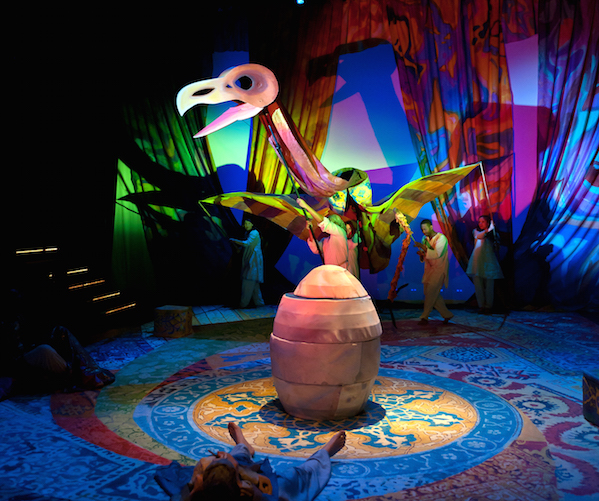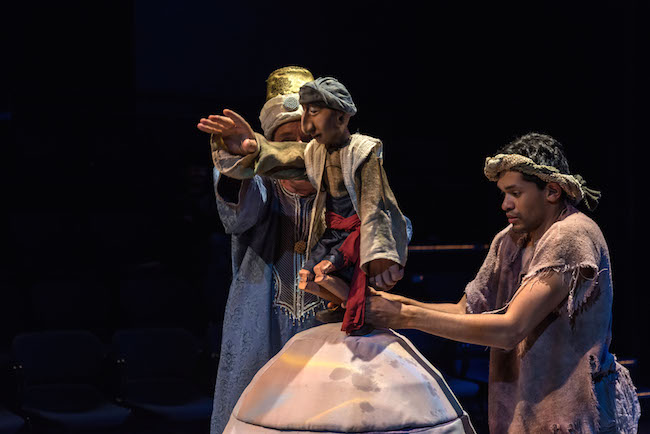Theater Review: “Arabian Nights” — A Fabulous Fantasy for All Ages
The actors’ infectious energy and absolute dedication to imaginative play-acting help make Arabian Nights spellbinding.
Arabian Nights, Adapted by Dominic Cooke. Directed by Daniel Gidron. Presented by the Nora Theatre Company and The Underground Railway Theater at the Central Square Theater in Cambridge, MA, through January 3.

A eye-popping scene from “Arabian Nights.” Photo: A.R. Sinclair Photography.
By Jess Viator
Family-friendly theater is a very tricky thing; a stage company must engage the less mature sensibilities of young children while simultaneously entertaining the more sophisticated sensibilities of adults. Successful productions aimed at children don’t talk down to them (or go the cliche empowerment Disney route); they concentrate on producing the sort of intelligent entertainment that grips younger people. Chances are that individuals of every age will enjoy it. And that is just what the Nora Theater Company/Underground Railway Theater has pulled off with their brilliant Arabian Nights.
Arabian Nights proffers a whirlwind of imagination:its vignettes are based on the Middle Eastern folktales featured in One Thousand and One Nights, a lineup neatly framed by the overarching story of the storyteller, Shahrazad. The performers deftly act out these tales, using exaggerated physicality and minimal props, evoking a multitude of eccentric characters and fantastical settings. Shahrazad and the ensemble transform themselves into various characters right before the audience’s eyes, telling their funny, touching, and sometimes gruesome stories directly to the audience. Yet they never dumb down their performances, zipping up their characterizations for the sake of amusing kids. The performers are vivacious and playful in a way that is engaging rather than scenery-chewing.
The frame story features a king, Shahrayar, who is embittered and murderous after being betrayed by his wife. He has his spouse killed and then marries a new woman every night. The next morning he has her executed. His Vizier is horrified by this barbarity, but has no power to stop it. The Vizier’s daughter, Shahrazad, comes up with a nervy plan to cease the king’s brutal cycle—and so she elects to marry the king herself. She invites her clever sister Dinarzad to spend the night with her and murderous hubby in the palace. Dinarzad is instructed to wake Shahrazad before the dawn and ask her to tell a story. Shahrazad is renowned for her yarn-spinning; she tells tales with such charm and enthusiasm that everyone who listens is spellbound. King Shahrayar is no exception; he is so caught up in the narrative that when it is time to have her killed, he stays her execution until the next day. Shahrazad continues to tell her stories night after night, and with every new chronicle — stuffed with themes of love and adventure and acceptance and mirth — the king’s heart softens. He learns that “life without joy is a living death.” He and Shahrazad live happily ever after.
The actors’ infectious energy and absolute dedication to imaginative play-acting sweep up the audience as well. Alexandria King sparkles as Shahrazad, easily changing from deferential daughter and wife to captivating storyteller. Alexander Cook takes on a number of roles; his wonderfully animated face and spot-on comic timing routinely crack up the audience. Elbert Joseph brings a boundless physicality to the figures he plays. All of the actors were skillful puppeteers, often using their bodies and faces as agile extensions of the puppets. The latter provide some of the most memorable moments in the production, especially a giant, multicolored rook, which flew over the audience. leaving us all with our jaws on the floor.
Director Daniel Gidron and choreographer Judith Chaffee have made good use of the stage space. The production creates and then maintains a resolute intimacy, from the actors conspiring with audience members to a dynamic theatricality that always comes off as close-up and personal. The bold, colorful lighting and refined costuming, reinforced by Gidron’s nimble use of a modular set and simple props, reinforces the idea that the imagination is elemental and essential. The actors put on capes and become thieves on horseback, an impenetrable rock wall, or piles of gold; the flexibility of this fantasy is inspired by how children need only couch cushions and blankets to create a great adventure.

Alexander Cook & Bari Robinson in “Arabian Nights.” Photo: A.R. Sinclair Photography.
Dominic Cooke’s adaptation of the source material pulls no punches. These stories touch on some disturbing and thought-provoking elements — at times the issues float a little above the comprehension of younger children. For example, the Ali Baba and the 40 Thieves story presents a dismembered body and, though they are not remotely realistic looking, the prop’s limbs are covered in red paint. The infidelity of the king’s first wife is handled honestly. Adultery and death are discussed frankly; it’s refreshing that there is no attempt to sugar-coat the details for the sake of assuaging the kids.
The show’s discussions of Islamic law, as well as of the culture’s rituals and traditions, are of particular relevance now. Islam is integral to some of these stories, and the matter-of-fact treatment at a time of intolerance is one of brave and important merits of this revival of Arabian Nights. During the intermission I noticed a young girl in the audience take her mother’s scarf and drape it over her head, pretending to be the actress onstage. She had no sense of how radical and complicated and fraught her actions were; she was just a child pretending to be a character she admires. Arabian Nights demonstrates how theater, when filled with sufficient empathy and imagination, can be a tool to combat prejudice.
Jess Viator is an emerging independent theater director, an occasional stage manager, and a lapsed playwright. She has a BA in theater performance, and recently completed a master’s degree in theatre studies from the University of Dundee in Scotland.
Tagged: Arabian Nights, Daniel Gidron, Dominic Cooke, Jess Viator, Nora Theatre Company
